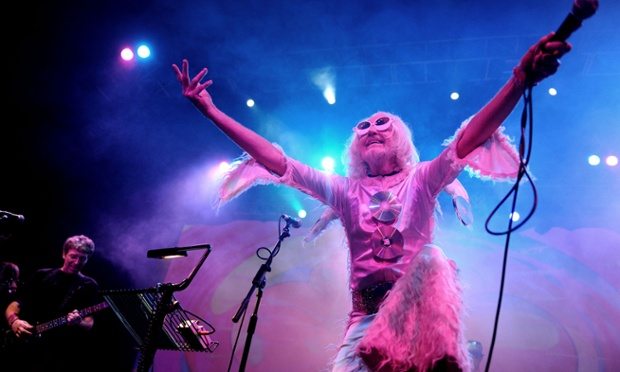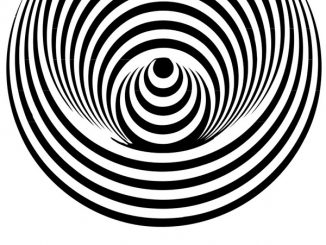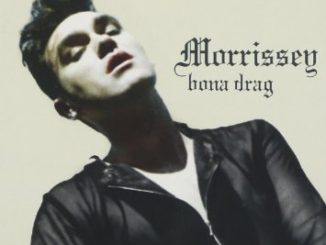
The founder of Gong and Soft Machine was a man who beat his own path, regardless of the bizarre directions in which he found himself travelling

How best to explain Daevid Allen to an outsider?
People loved Daevid Allen: he was warm, friendly, vibrant, lively. The original anti-establishment, anti-capitalist hippie. He was given to exotic, wild flights of psychedelic fancy that took in the warp and woof of the Western esoteric condition as preached by the poet Robert Graves, and moved them into inner flights of fancy with a light-hearted bent. For a while in the 80s, he drove cabs in Melbourne until he took out a loan from a fellow member of Gong, the group he founded, to go on a “how to teach rebirthing course”. His music is like Sun Ra meets Vivian Stanshall meets DIY punk meets a really big fucking bong.
Except when it isn’t.
Nothing makes sense when you talk about Daevid Allen. Everything makes sense.
He was a beat poet, also known as Divided Alien, an early contemporary of Barry Humphries, who moved across to London from Melbourne in 1961 via a sojourn in Paris, where he stayed in the room at the Beat Hotel recently vacated by Allen Ginsberg and Peter Orlovsky. He met William S Burroughs, he formed a free jazz trio … then he founded Soft Machine with his London landlord’s son Robert Wyatt. In 1967, during the Paris riots, he handed out teddy bears to the police.
Soft Machine were an exceptional band, early on: improvisational, folky, free-spirited. Some credit them with starting prog rock, but that seems mean. Anyway, Allen was far away by then. He’d long ago absolved himself of responsibility.
In some respects, Allen invented punk rock. Too extravagant a claim? Do the maths. Without Soft Machine, there’d have been no Pink Floyd, at least the version that evolved after Syd Barrett left. And without Pink Floyd, nothing for the punks to kick against.
How best to explain Daevid Allen to an outsider? After Allen had his psychedelic vision under the influence of Graves – they met in Majorca – he formed Gong (later known as Planet Gong, Mother Gong, New York Gong, Acid Mothers Gong, and so on). The idea behind the “band” was, according to long-time member Mike Howlett, to “allow the musicians to play for a higher source or a less self-centred focus”. Whatever that means.
Gong were one of the anomalies of the 1970s and 1980s: a haphazardly sideways psychedelic explosion of crap jokes and decent tea: Monty Python as reimagined in a series of musical acts, genuinely surreal.
As one fan remarked upon hearing news of Allen’s death: “Everyone should have a copy of Camembert Electrique, Flying Teapot, Angels Egg and You as a minimum.”
Well, absolutely.
Flying Teapot (Radio Gnome Invisible Part 1) is the one, surreal in its funk immolations and whispered wonderings. It was recorded in 1972, but the French recording company financing it went bankrupt. Richard Branson thought he could release it to recoup some of the unpaid recording costs with his new record company, Virgin. It became the second album on Virgin – after Tubular Bells.
The following is taken from Gong’s Wikipedia page – and if this doesn’t explain the appeal of Daevid Allen… well there’s no hope.
“The story begins on the album Flying Teapot (1973) when a pig-farming Egyptologist called Mista T Being is sold a ‘magick ear ring’ by an ‘antique teapot street vendor & tea label collector’ called Fred the Fish. The ear ring is capable of receiving messages from the Planet Gong via a pirate radio station called Radio Gnome Invisible. Being and Fish head off to the hymnalayas of Tibet (sic) where they meet the ‘great beer yogi’ Banana Ananda in a cave. Ananda tends to chant ‘Banana Nirvana Mañana’ a lot and gets drunk on Foster’s Australian Lager.”
Shortly afterwards, Allen left the band to their own devices, and they became the much dryer, more serious proggy band more commonly associated with the name. The maverick musician moved to the village of Deià in Majorca, where he joined a hippie collective.
Allen’s Gong played two reunion shows in 1994 in London, and between 1996 and 2001 toured America four times. Since, then Allen has played sporadically with the band, and conducted many surreal and wonderful poetry readings.
In March 2014 – two days before he was due to play a spoken word house show in Brisbane (with me supporting), he broke his arm. During treatment, a cyst on his neck was determined as cancerous, and he underwent radiation therapy. It didn’t take.
On 13 March, Daevid’s son Orlando Monday Allen announced on his Facebook page that his father had passed away. He was 77. He played his final gig in his home town of Byron Bay two weeks earlier – back as a beat poet for one final time – reading out the following lines:
“For what is it to die but to stand naked in the wind and to melt into the sun?
And what is it to cease breathing but to free the breath from its restless tides, that it may rise and expand and seek God unencumbered?
Only when you drink from the river of silence shall you indeed sing.
And when you have reached the mountaintop, then you shall begin to climb.
And when the earth shall claim your limbs, then shall you truly dance.”
According to Mike Howlett, lawyers looking over Gong accounts have claimed that more than 20m albums have been sold in various incarnations. As with much of Daevid Allen’s life, it’s hard to tell how much of this is a flight of fancy and how much a reality. Or whether it even matters.
Rest in peace, crazy diamond.
This article is from The Guardian Website




Be the first to comment